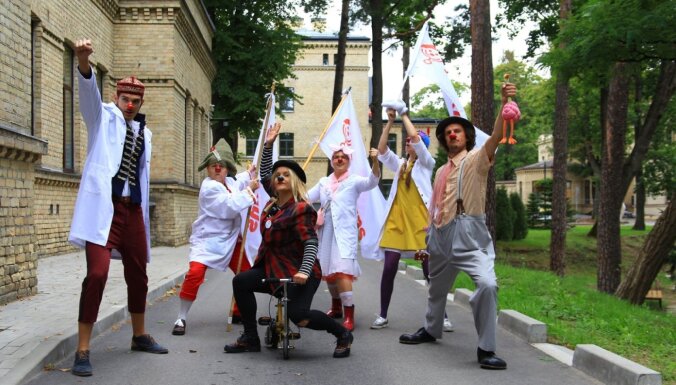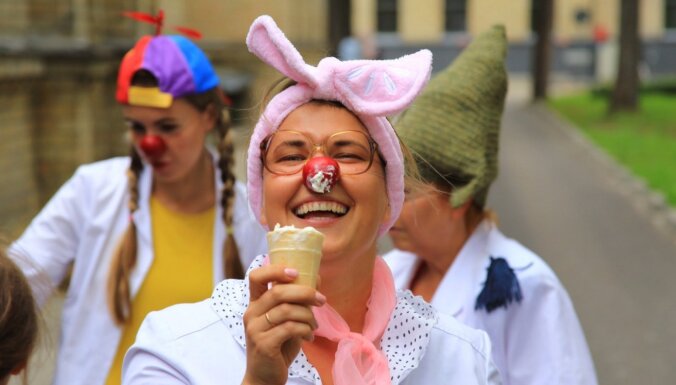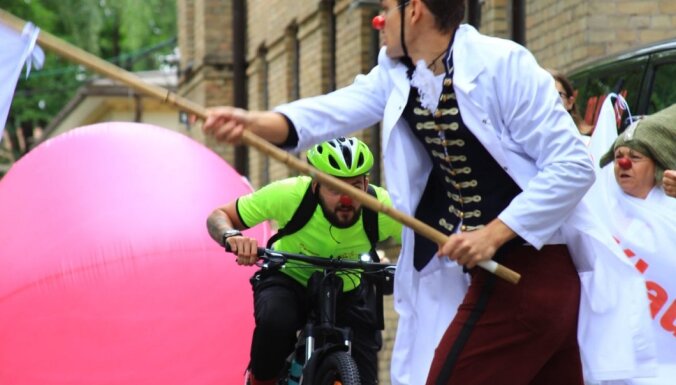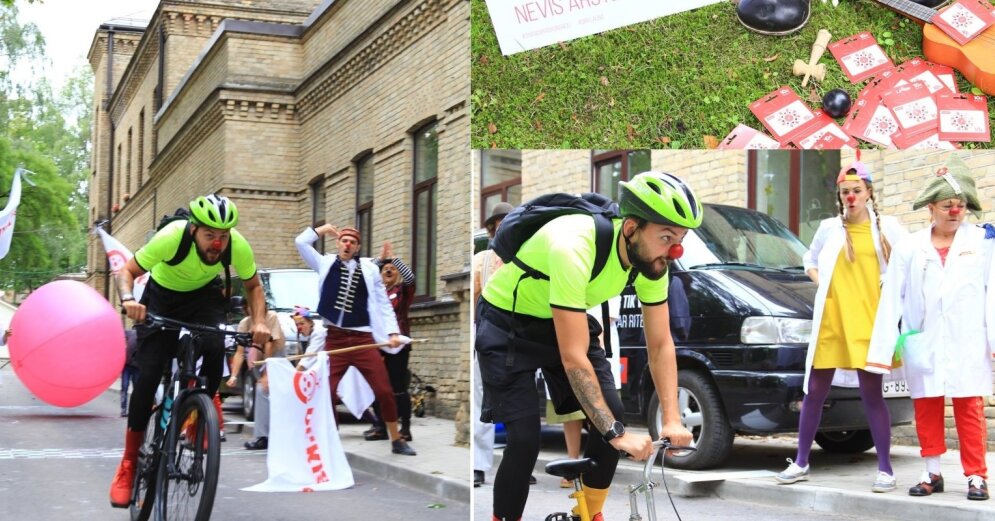The special, individual cycling marathon of the Children’s Clinical University Hospital has started. Dr. Clown Jānis Taukulis travels throughout Latvia to support children who need long-term hospital treatment. As Jānis says: “These children have to experience their marathon, fighting for their health.” We tell you what the route of the Doctor Clown Marathon is, what the essence of the idea is, and how each of us can get involved and support it. “
–
–
Content will continue after the ad
Advertising
–
Jānis Taukulis or medical clown on behalf of Dr. Jaukulis has gone on a 20-day cycling marathon, planning to cover about 100 kilometers every day. Jānis has created his route in the form of an infinity sign, moreover, so that the road leads through the cities where Dr. Clowns works in hospitals – the road will lead to Daugavpils, Rēzekne, Valmiera, Cēsis and Liepāja. The intersection – the starting and ending point – is the Children’s Clinical University Hospital, where the largest family of Doctor Clowns lives. In total, he will cover about 2,000 kilometers and visit more than 10 settlements throughout Latvia.
In his journey, Jānis combines adventure with a noble goal: it is to support children who have to receive long-term hospital treatment. This difficult time for children is like a marathon, and, as you know, no marathon is easy, even the strongest and strongest athletes get tired. One can only imagine how much difficult emotions and pain an infant or child who spends several months in hospital undergoes a variety of procedures and tests.
“Children who have to spend more time in hospital are taken out of their usual environment. They lack everything close, loved and known to what they are used to. Children lack ease and games where they can get rid of energy and experience various emotions – anger and “Fear of joy and tenderness. The long-term relationship between Dr. Clown and the child, meeting from time to time for the joy of the game, is unique. In addition, the clown helps the child to accept what is happening, socialize in the hospital, make friends with others,” says Jānis

–
Aija Zvirgzdiņa tells us about the importance of emotional support for families whose children have been in the hospital for a long time – her son Reinis was only seven years old when he was hospitalized with a severe diagnosis of lymphoma, undergoing various examinations, many chemotherapy, pain and side effects.
According to Aija, Reinis gradually turned from a cheerful and carefree child into an unhappy person, became angry, nervous, anxious, and became more and more introverted. Rein himself says that “it was terribly unpleasant when at least two analyzes had to be done a day”. Answering the question of what was the most difficult thing for my mother, especially at the beginning, Aija talks about anxiety and ignorance: both waiting for the results of the examinations and thinking about how to live with it all, how to build the future of their family. Helped by relatives taking on household responsibilities, as well as doctors and nurses who calmly and professionally answered all the questions, it was very psychologically supportive.
However, Rein was already at the age when he could be clearly aware of what was happening, he realized that he was deprived of much of what other children have. And here it was very important to remember that he is first and foremost a child, not a disease and a diagnosis.
“One night I suddenly saw that Reinis was the same boy again,” Aija recalls. “He told me that Doctor Clown had come, and he laughed so much that even his cheeks started to hurt, it was so great! When he fell asleep peacefully, I thought – here’s what you have to learn from children, they really know how to live” here and now “The joy and mischief brought by Dr. Clowns, his ability to make his whole day happy, overshadowed the unpleasant, made him forget for a moment why he was in the hospital.”
The medics also came to support all the marathon riders (both Dr. Clown Jānis and the children he is going to support). Polina Popeiko, a resident doctor at the Children’s Clinical University Hospital, noted that Dr. Clowns are important assistants to the hospital staff: “When a child is scared and it is not clear what is going on, he feels bad. hospital routines, then joy, smile and laughter appear.It gives the child the strength to heal faster.The presence of Doctor Clowns also helps us, the doctors – it is easier for us to make contact with the child and it facilitates the work.Of course, we also like to hang out in our free time and joking with Doctor Clowns, it improves the mood for the whole day “.

–
Doctors Clowns come to the hospital every day. Their job is both to provide support at a critical time when a child suddenly goes to hospital, and to build long-term relationships with young patients and their families when they need to be in hospital for much longer and more often than they would like.
Associations “Dr. Clown“Manager Marianna Milovska explains:” This cycling marathon is part of our charity campaign “Help heal, not treat!”. The idea of the marathon reflects the work of Doctor Clowns well – it is not short and fast, it is not a one-time event. We try to support anyone who unfortunately has to be in the hospital. At the same time, it is very important for us to be around children and their relatives on a regular basis, especially for those for whom the path to health is like a real marathon. “
Follow John’s route and adventures along the way Doctor Clown on Facebook page.
If Dr. Clown Jaukulis will also enter your city, look for a marathon bus, take your red noses with you and come and meet Dr. Clowns!
Anyone can participate in the charity campaign and support Doctors Clowns – by donating on the website www.drklauns.lv, buying “TIO” ice cream, as well as donating in donation boxes located in “Rimi” stores or in the “Rimi” e-store. You can also buy Dr. Clown’s red nose there, or choose to donate your “My Rimi” card savings to the charity campaign.
All donated funds are directed to the daily work of Doctor Clowns and help them to be where the small patients, their parents and doctors are waiting – in Latvian hospitals.

–
Dr. Clown has been operating as a public charity since 2012, and its representatives – 35 professional medical clowns – go to the Children’s Clinical University Hospital and other hospitals in Latvia every day to psychologically help children, making everyday life easier for small patients. staying in a medical institution. The Dr. Clowns project is being implemented by Dr. Clowns in cooperation with the Children’s Clinical University Hospital and the support of Latvia’s leading dairy processing company Food Union and Pēteris Avens charity foundation Paaudze.
–

